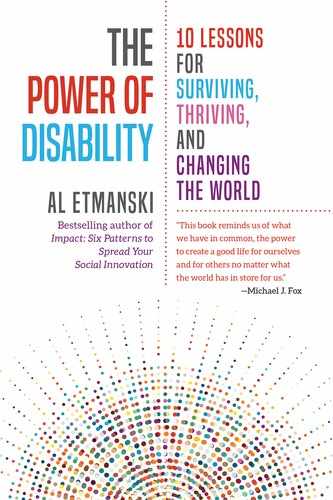A Word about Words
Special needs, differently abled, handicap, or disability?
Mental, intellectual, cognitive or developmental disability?
Autistic, Asperger’s syndrome, autist, high functioning,
autism spectrum disorder (ASD), or neuro-diverse?
Hearing-impaired, deaf, or Deaf?
Paralyzed, spinal cord injury, paraplegic, quadriplegic,
wheelchair user, or wheelchair rider?
Blind, visually impaired, or nonvisual learner?
Mentally ill, mad, or crazy?
WHAT’S CORRECT? WHAT’S OFFENSIVE? In most cases, it depends on context and personal preference. The nomenclature of disability is evolving with the times. It comes complete with its own language, definitions, jargon, and symbols. Although not as complicated as insider baseball, these are under constant renovation, swirling with adjustment, while leaving artifacts and descriptors from the past clinging to life. For example, words like idiot, imbecile, and moron are still in use. And they are still hurtful.
That’s why it is never acceptable to use the word retarded, not even in jest. Or to describe someone as “confined” or “bound” to a wheelchair. It’s the exact opposite. Wheelchairs, canes, scooters, and other mobility devices represent freedom, liberation, participation. Nowadays Asperger’s syndrome is dropping out of use because Asperger was a doctor associated with the Nazis.
A disability includes conditions that have a long-term impact on your mobility, dexterity, seeing, hearing, intellectual development, mental health, or some combination of them. These conditions may affect how you bathe, dress, move around, and interact and communicate with others, as well as how you learn, remember, and concentrate.1 A disability is not a sickness. There is nothing wrong with the person. It isn’t a bad thing. People don’t suffer from their disability. If they experience pain or other side effects, those can usually be addressed in the same way you treat and manage yours. Generally, people with disabilities aren’t looking for a cure, although I know people who would take a cure if it were available—for example, for a spinal cord injury or Parkinson’s disease. At the same time, they are not waiting for a miracle, and they have active, fulfilling lives.
Some disabilities are visible. Most aren’t. For example, more than 130 million Americans live with invisible and pain-related disabilities such as brain injury, fibromyalgia, Lyme disease, scoliosis, Crohn’s disease, and lupus. You can be born with a disability or acquire one during your lifetime. If you live long enough, you likely will.
All disabilities are accompanied by visible and invisible barriers. These include narrow doorways. Stairs without ramps. Street curbs without cuts. Traffic lights without beeps. Gatherings without sign language interpreters. Language that is complicated, full of big words, and hard to follow. Teachers and institutions that ignore your learning style. And websites that don’t use alt text. Alt text is a written description of pictures and images on a website. It tells people who are unable to see and who are using a screen reader the nature and content of the visuals on the web page. Alt text is the equivalent of a wheelchair ramp making the web accessible for many people with disabilities. Some barriers are cultural, as in those beliefs, stereotypes, and attitudes that lead to discrimination, low expectations, and exclusion from the job market, and from society. One of the biggest cultural barriers is poverty. Governments are more willing to allocate money for programs run by professionals than they are to provide individuals with a decent income or give them financial control over the services they use. This reveals a mind-set that people with disabilities don’t know or can’t be trusted to spend the money on their best interests.
Person First versus Identity First
For decades, most people preferred to be described as a person with a disability. They didn’t want to be defined by their disability. That’s certainly the way I was schooled. Besides, a diagnosis, category, or label doesn’t reveal very much about a person. Certainly not his or her spirit, personality, and character.
There is a new wave of people who prefer to be described as disabled first. The following tweet from a leading disability activist reflects this preference: “I am unapologetically disabled. My choice. My experience. My identity.”2 Disability is central to their lives, and they don’t want it pushed into the background. They want to celebrate their disability. This pride in identity has existed for a long time in the deaf community. If you are deaf and identify with Deaf culture, you use a capital D. Otherwise, you use the lowercase, d as in deaf.
Regardless of preference, people with disabilities don’t want people who don’t have a disability to define who they are. They interpret phrases such as differently abled, handi-capable, diverseability, and special needs as denying an essential aspect of their identity, and as suggesting that there must be something negative or bad about their disability if people are trying to obscure it.
Some folks are taking back terms like crip and mad, flipping their negative connotations and breathing positive life into them. The hiphop community does that too. The word ill means “very cool” in their community, which may be one of the reasons why some of hip-hop’s biggest stars have a disability. Others poke serious fun at society’s fascination with classifications. The Institute for the Study of the Neurologically Typical parodies the idea of normal. They describe normal as “a neurobiological disorder characterized by preoccupation with social concerns, delusions of superiority, and obsession with conformity.”3
I’ll use person-first language (i.e., a person who has a disability, as opposed to a disabled person) throughout this book most of the time. That decision is based on the recommendations of my friends and colleagues with disabilities whom I consulted. However, should the person I profile have another preference, I will use it. Despite my best efforts, there are bound to be inconsistencies and mistakes, which I apologize for in advance.
As a general rule, if you are wondering what language to use, ask. Don’t assume. It could be the start of a beautiful relationship.
